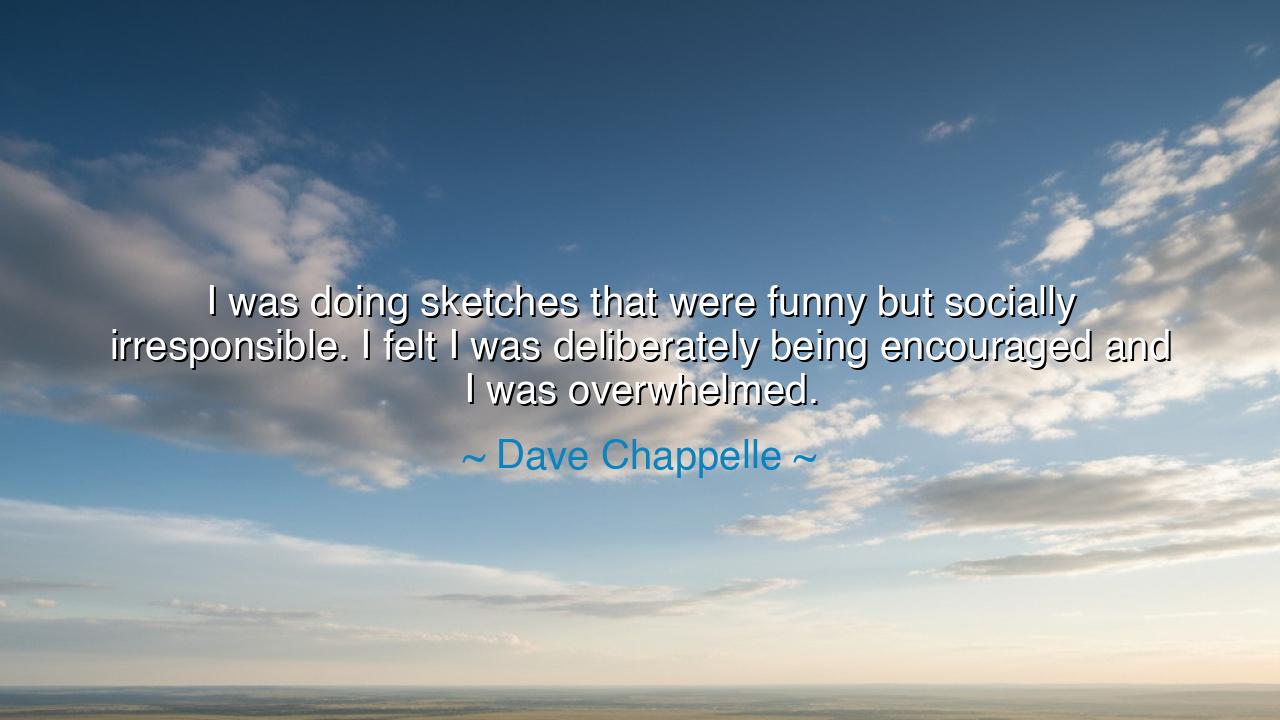
I was doing sketches that were funny but socially irresponsible.
I was doing sketches that were funny but socially irresponsible. I felt I was deliberately being encouraged and I was overwhelmed.






The words of Dave Chappelle—“I was doing sketches that were funny but socially irresponsible. I felt I was deliberately being encouraged and I was overwhelmed.”—speak from the depths of a soul caught between art and conscience, between the call to entertain and the duty to enlighten. They are not merely the words of a comedian—they are the lament of a philosopher who has seen how laughter, though sacred in its power, can also be twisted into something dangerous when detached from truth. In this confession, Chappelle reveals the weight that falls upon every artist who realizes that fame without integrity is a form of slavery, and that true freedom lies not in applause, but in alignment with one’s moral compass.
To be “funny but socially irresponsible” is to wield the sword of humour without care for where it strikes. Chappelle, in the height of his success on Chappelle’s Show, saw that his sketches—though celebrated—were beginning to echo the very stereotypes and divisions he once sought to dismantle. He saw the laughter of his audience shift from understanding to indulgence, from reflection to mockery. What was meant to reveal truth began to obscure it. In his words, we hear the cry of the artist who suddenly sees that his creation has turned against his purpose. He was encouraged, yes, but not in wisdom—encouraged by forces that profit from ignorance, that feed the crowd’s appetite for ridicule rather than revelation.
This struggle is as old as art itself. In the theatres of ancient Athens, Aristophanes wielded satire like lightning, mocking war, politicians, and the foolishness of men. But even he, the father of comedy, warned of humour’s double edge. A joke that lifts truth enlightens; a joke that mocks the powerless corrupts the spirit. Chappelle’s realization mirrors this ancient wisdom. When he says he was “overwhelmed,” it is the same weariness that overtook many prophets and philosophers who dared to confront the machinery of entertainment and power. To make people laugh is to hold their hearts for a moment—but to awaken their minds is to risk everything.
The origin of Chappelle’s quote lies in the turning point of his life: his decision to walk away from Chappelle’s Show at the height of its glory. In doing so, he stepped into exile—not from art, but from illusion. He refused the empire of fame built on compromise. Many called him mad; others called him brave. But in truth, he had simply chosen integrity over indulgence. Like the ancient sage Diogenes, who lived in a barrel rather than bow to hypocrisy, Chappelle embraced the discomfort of truth rather than the comfort of deceit. He saw that when art no longer serves humanity, it becomes a hollow spectacle, and the artist a puppet dancing to unseen strings.
Yet there is tenderness in his words as well—an acknowledgment of human weakness. To be “overwhelmed” is not to be defeated, but to feel too deeply in a world that feels too little. Chappelle’s confession is not one of guilt, but of awakening. It reminds us that laughter, though joyous, carries responsibility. To make others laugh is to shape their view of the world. The power of humour must be guided by wisdom, or it will become cruelty disguised as wit. The artist, like the leader, must ask not only “Is it funny?” but “What does this laughter serve?”
From his reflection, we draw a lesson as enduring as the ancient laws of the heart: art must not abandon its soul for applause. In every profession, in every passion, we face the same temptation—to trade truth for approval, conscience for comfort. But the moment we do, we lose the very essence of what makes us human. The path of integrity is harder, lonelier, and often misunderstood, yet it is the only road that leads to peace. For when the noise of the world fades, only the voice of one’s conscience remains—and it must not find you silent.
So, my friends, let Chappelle’s wisdom be a torch in your journey. Do not let your gift serve false gods. Whether you speak, write, build, or create, let your work spring from the well of sincerity, not from the hunger for applause. When your craft brings laughter, let it heal rather than wound. When it brings truth, let it elevate rather than shame. The world will tempt you to please the crowd, but greatness lies in pleasing the truth.
For in the end, Chappelle’s words remind us that the artist is not measured by how loudly the world laughs, but by how deeply it understands. To be funny is a gift; to be responsible with that gift is divine. And when the laughter fades and silence returns, the artist who has spoken truth will find not regret—but freedom.






AAdministratorAdministrator
Welcome, honored guests. Please leave a comment, we will respond soon